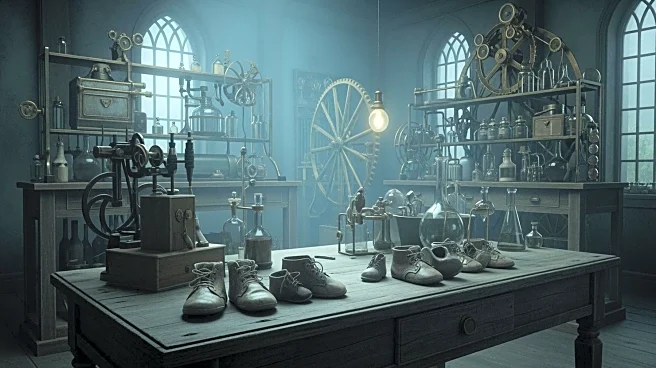What's Happening?
Guillermo del Toro has released a new adaptation of Mary Shelley's classic novel Frankenstein on Netflix. The film retains the core story of Victor Frankenstein, played by Oscar Isaac, who is obsessed
with conquering death. Victor's experiments are funded by Harlander, a wealthy arms dealer portrayed by Christoph Waltz. The film delves into Victor's mania, driven by the loss of his mother and a cold upbringing. Victor's creation, a stitched-together man played by Jacob Elordi, is brought to life, but Victor soon regrets his actions and attempts to destroy the creature. The film shifts to the creature's perspective, highlighting his struggles and eventual quest for revenge against Victor.
Why It's Important?
Del Toro's adaptation of Frankenstein is significant for its exploration of parental themes and the consequences of obsession. The film portrays Victor as a flawed father figure, whose desire for validation leads to the abandonment of his creation. This narrative resonates with broader societal themes of parental responsibility and the impact of neglect. The film's unique visual style and attention to detail offer a fresh take on a 200-year-old story, potentially influencing future adaptations of classic literature. The release on Netflix also highlights the platform's role in bringing diverse and innovative storytelling to a global audience.
What's Next?
Frankenstein is set to premiere in select theaters on October 17th and will be available for streaming on Netflix starting November 7th. The film's release may spark discussions on the adaptation of classic literature and the portrayal of complex themes in modern cinema. It could also lead to increased interest in del Toro's work and further collaborations with streaming platforms. As audiences engage with the film, there may be debates on the interpretation of Shelley's novel and its relevance to contemporary issues.
Beyond the Headlines
Del Toro's Frankenstein offers a deeper exploration of the ethical implications of creation and the responsibilities of a creator. The film's focus on the relationship between Victor and the creature raises questions about the nature of humanity and the consequences of playing God. This adaptation may prompt viewers to reflect on the moral dilemmas associated with scientific advancements and the importance of empathy and understanding in human interactions.









